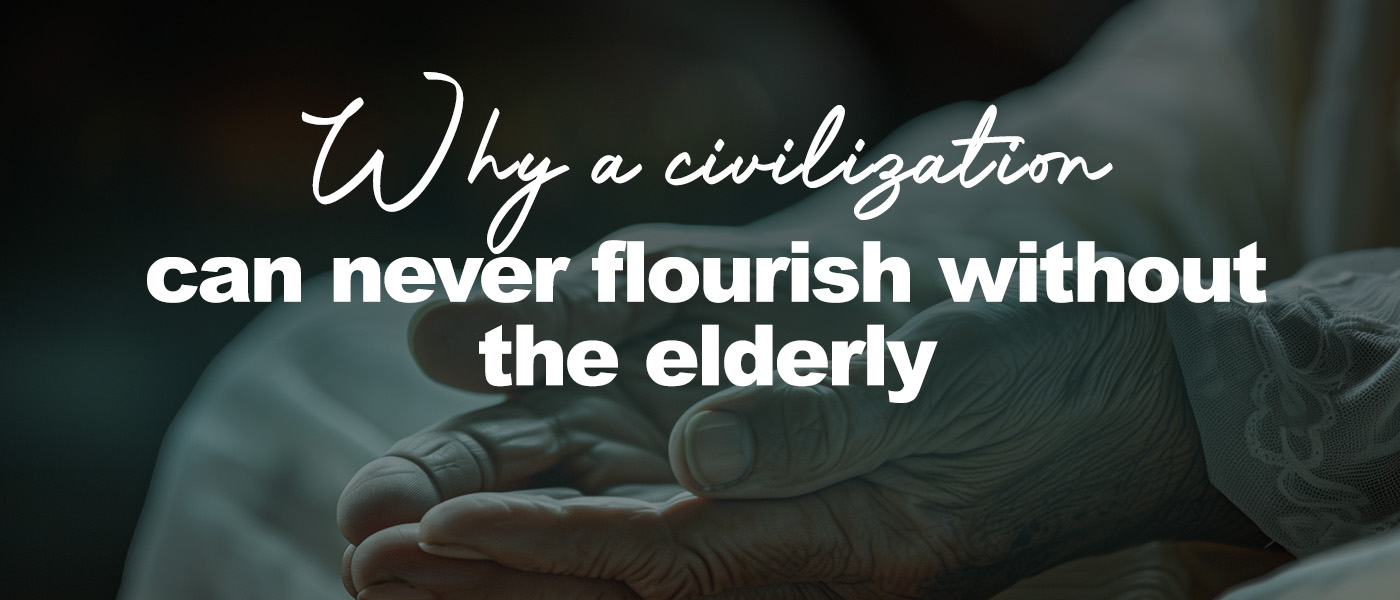In many homes, we often find that there is a quiet space that is maybe overlooked on a day-to-day basis, but carries the most tranquility and blessings that is not found anywhere else in the household. Perhaps near the window, where the morning light falls most softly, a worn chair has been placed with a folding table in front of it. The chair’s fabric may be frayed just like the patterned musallah that is draped upon the table, the chair’s frame must be slightly tilted with time or due to the prolonged hours of having sat atop it for worship, and the room is blanketed with a fragrant aroma caused by the itar coming from the small number of clothes that are tidied and tucked away into the closet. In that chair, we are blessed to see one of our elders sitting there with their faces bearing the markings of experience and whose silence is filled with so much wisdom and ilm.
Unlike many others in the household who might be struggling to catch up with the urgency of life, for the elderly, every moment of their life is now spent in a manner that is slow, appreciative, and reflective. Time has slowed their steps and softened their voice, yet their dignity remains intact. This person has lived through eras, weathered hardship, raised generations, and worshipped their Lord through days of ease and difficulty. Their lives are composed of moments that others quickly forget such as the quiet labor of raising children, the long nights spent in dua, the endurance through illness, poverty, or war. These are individuals who carried nations on their backs while remaining unseen, and now, in the twilight of their years, they ask for little such as a comfortable presence, kindness, and recognition of their place in the moral fabric of society.
On this International Day of Older Persons, the world rightly pauses to acknowledge the elderly but, in Islam, such acknowledgment is not a commemorative act, it is a continuous command. The elderly are not simply members of our community, they are truly its moral anchors, its spiritual reserves, and often, the very source of barakah in a household. Islam teaches us that aging is not a form of decline in life like how many people think it is. The era of aging is actually a form of elevation. It is not the fading of purpose, but its refinement. To grow old in Islam is to carry the weight of time with grace, and to be honored for it.
This article explores how Islam has always centered the elderly from divine revelation to prophetic action, from family structure to societal values, and this shows us that honoring the elderly is an obligation, and one that speaks to the very heart of Islamic ethics.
Aging has one of the best spiritual opportunities after your years of youth
In many societies today, aging is seen as decline, a slowing down of life, a retreat from relevance. Careers start to wind down, physical strength diminishes, social circles may shrink, and there is often a sense of being left behind. However, The Quran teaches to flip that perception completely. To Allah (SWT), aging is not a phase of loss, it’s a phase of elevation. It’s a station of life where mercy becomes more visible, humility becomes more valuable, and dua becomes more powerful. It is not the beginning of disappearance, but the deepening of presence. For example, when we go into the masajid, our parents often instruct us to look after the seniors of our community by helping them if they need to stand, walk, or sit. We are encouraged to get them water should they need it, to throw away their trash so they don’t have to exert themselves, and to approach them and greet them in a way that is respectful, soft-spoken, and kind.
These are such small actions, but what do we see happens as a result of it? Their aged faces brighten with a smile. They place their hands affectionately atop our heads. A string of prayers falls nonstop from their lips as their hearts soar just because someone aided them.
Referring to Surah Al-Isra, this chapter of The Quran contains some of the most beautiful illustrations of how Allah (SWT) views old age. After commanding us to worship Him alone, He (SWT) immediately follows with an ethical instruction when He (SWT) says, “For your Lord has decreed that you worship none but Him. And honor your parents. If one or both of them reach old age in your care, never say to them even ‘ugh’, nor yell at them. Rather, address them respectfully.” (The Clear Quran®, 17:23)

Then, Allah (SWT) says in the very next verse, “And be humble with them out of mercy, and pray, ‘My Lord! Be merciful to them as they raised me when I was young.’” (The Clear Quran®, 17:24)
Why does Allah (SWT) command us to do these things immediately after instructing us to worship Him? Because as our parents grow older, they return to a kind of childlike vulnerability not in their mindset, per se, but in dependence. The very hands that once held you through sickness, you hold to help them walk. Allah (SWT) doesn’t stop at just telling us to be kind, he (SWT) commands us not to even utter a sound of frustration. This is remarkable. In a world that often loses patience with the slow or forgetful, Islam teaches us that restraint in tone is part of righteousness.
Yet beyond commands, The Quran offers something more personal, and that is dua. When we ask our Creator to have mercy on our parents because they raised us when we were small, this is a divine reminder that our parents would wake up in the middle of the night to check if we are breathing. They would hold our trembling hands on the first day of school. They have sacrificed, worried, prayed, and they’ve done all of this silently. So when they reach the age where they forget things, or move more slowly, or repeat the same story, this is our chance to mirror the mercy they once showed us. And, in doing so, we are not just being polite, we are also worshipping Allah (SWT) simultaneously.
How the Prophet of Mercy used to treat the elderly
Our beloved Prophet Muhammad (SAW) modeled the respect and good akhlaaq towards the elderly in every step he (SAW) took in life. The Prophet (SAW) did not restrict his reverence for elders to those he (SAW) knew personally, or those whose status demanded respect. Rather, he (SAW) established a universal ethic that age, by itself, commands honor. In a world that often associates worth with youth, relevance, and productivity, the Prophet (SAW) offered a radically different perspective. He (SAW) teaches us that the passage of time upon a person with its trials, wisdoms, and accumulated experience, is a mark of distinction.
He (SAW) has stated in no uncertain terms, “He is not one of us who does not show reverence to our elders, mercy to our young, and recognition to our scholars.” (Tirmidhi)

This hadith is a moral line. When the Prophet (SAW) says, “not one of us,” it denotes a serious ethical division. Failing to uphold this value means one has distanced themselves from the prophetic way, not merely in personal conduct, but in the very ethos of the Ummah. This respect for the elderly in the Prophet’s (SAW) life was structurally embedded into communal life. In gatherings, he (SAW) gave the elders the first word. During meals, he (SAW) encouraged the youngest to serve but insisted the eldest begin eating. In leadership matters such as leading salah, he (SAW) prioritized the most knowledgeable in Quran and Sunnah, but if knowledge was equal, then the one older in age was given precedence.
This framework teaches us that respect for the elderly is not a matter of our mood and whether circumstances require it, this is all systemic. It is woven into the habits, institutions, and interpersonal conduct of a truly prophetic society. For contemporary Muslims, this model carries profound implications. In a time when conversations move quickly, opinions are easily dismissed, and generational gaps widen into cultural chasms, the Prophetic example challenges us on how, as an Ummah, to embed respect into our homes, masajid, and communities.

Too often today, the voices of the elderly are overlooked not because they lack wisdom, but because they speak at a pace we no longer have patience for. Their stories are brushed aside as “irrelevant,” their advice has been labeled as “outdated,” and their presence sometimes is perceived as inconvenient. However, the Sunnah reminds us that honoring elders is not about agreeing with them, it is about recognizing their right to be heard.
This act of listening, not just with the ears, but with the heart, becomes, in itself, a form of ibadah. To patiently sit and hear the recollections of an aging parent, to attend to their needs without complaint, or to ask for their prayers, these are not ordinary actions. They are deeply spiritual gestures that reflect the essence of our deen which are mercy, humility, and recognition of one another’s dignity. The Prophet (SAW) truly established a civilization built upon the respect of the elderly.
The elderly are a great source of barakah in our homes — cherish them before it is too late
Subhan Allah, those whose elders live with them know the feeling of having a quiet blessing in their homes. It may not be loud or dramatic, and it’s not the kind of “blessing” that makes headlines or generates a ton of excitement on social media, but it’s a soothing and stabilizing mercy that fills the walls of our homes, softens our hearts, and invites divine grace.
In one narration, the Prophet (SAW) said, “If it were not for the elderly bending their backs in worship, suckling infants, and grazing animals, calamities would rain down on you.” (Al-Bayhaqi)

That’s a heavy statement. It reminds us that sometimes the reason Allah (SWT) spares a community is not because of its wealth or progress, but because of the dua of an old woman in sujood. This is how Islam has framed the elderly. Their presence alone is a source of hifaazah for us. Their dua, especially in the early hours of the morning, ripples across families and generations. How many of us are living today on the back of an old woman’s prayer? How many of our achievements are the result of a grandfather’s nightly istighfar for his descendants? We will never know.
In an age where people chase barakah through productivity hacks and time management tools, the Prophet (SAW) is telling us that sometimes the greatest barakah is already sitting in your room, holding a tasbih. And when those elders pass, their absence is not just emotional, it is also spiritual. A light goes out, it seems. A veil of protection is lifted from our heads. So while we have them, let’s truly learn from them, sit with them, honor them, and ask for their prayers.
Why should the youth exhaust efforts in caring for the elderly?
If you’re young, healthy, and independent, it can be easy to feel that the elderly slow you down. However, here’s a perspective shift: your behavior towards elders is a test of your own character. Patience, compassion, listening: these are not passive traits, they are hard-earned virtues, and nowhere are they tested more than in your relationship with the elderly.
Whether it’s your parents, grandparents, or an elderly uncle who repeats himself too often, your response is a reflection of you, not them. The Prophet (SAW) has said, “Part of honoring Allah is honoring the elderly Muslim with white hair.” (Abu Dawud)

This generation of youth has knowledge at its fingertips. They are quick, efficient, and innovative. However, the soul doesn’t grow through speed, it grows through stillness, service, and humility. Spending time with the elderly teaches us all three. The way we care for our elders will shape how we are cared for in our old age. That’s not just a social truth, it’s a spiritual reality.
The Prophet (SAW) said, “Show mercy to those on the earth, and the One above the heavens will show mercy to you.” (Tirmidhi)

So don’t wait for a moment of regret. Call your grandmother today, sit with your father without checking your phone, ask your elderly neighbor how they’re feeling. These are small acts, but in the scales of Allah (SWT), they carry weight beyond measure.
Aging is not the end of anything, it’s only the beginning
In Islam, old age is not a footnote, it’s a chapter of honor. It is a time when a person draws nearer to Allah (SWT) through reflection, worship, and wisdom. For the rest of us, the presence of the elderly is a living reminder of our own mortality and our shared humanity. It teaches us patience, it humbles us, and if we pay attention, it prepares us for the same journey.
Let us not wait for funerals to begin honoring our elders. Let us not wait until they’re gone to say, “thank you,” “I love you,” or, “I’m sorry.” Their hands may be wrinkled, their voice softer, but within them lives a lifetime of service, sacrifice, and silent dua.
Dua
Oh Allah (SWT)! Preserve our elders, forgive those who have passed, and grant us the honor of serving them in this life so that we may be honored by You in the next.
Who will have mercy on us if You do not? Whose favor will we expect if we miss Your favors on the day of our neediness? To whom will we flee from our sins when our deadline comes?
Oh Allah (SWT)! Join us with the righteous ones among the past generations, include us with the righteous ones of this generation, guide us to the path of the righteous ones, help us against ourselves as You help the righteous ones control themselves.
Oh Allah (SWT)! When our time comes, make us die following Your Path and carrying the principles of Your Prophet (SAW).
Ameen!


